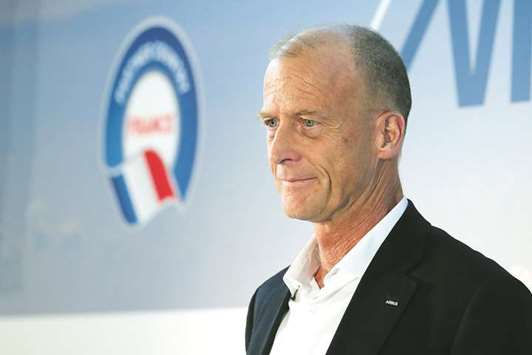Airbus SE chief executive officer Tom Enders sketched out the company’s plans for the next generation of European fighter aircraft and warned that Brexit means the UK could miss out on future production.
Airbus’s German operation is working with French warplane specialist Dassault Aviation SA on a fighter platform involving a range of aerial products, including drones and “swarms” of small aircraft, Enders said in an interview. A demonstrator model could fly as early as 2025.
“We’re not talking about ‘a’ military aircraft,” he said in Berlin on Tuesday. “We’re talking about a system of military-combat airborne elements. It’s a different system.” It’s not even clear whether there will be role for a piloted plane, the CEO added, saying that depends on requirements specified by the French and German governments.
The project, which envisages service entry after 2035, represents a threat to Britain’s position at the heart of warplane development as negotiations continue on terms for its exit from the European Union. Airbus has historically worked with London-based BAE Systems Plc in combat jets, with the companies partnered on the Eurofighter Typhoon and Dassault producing the rival Rafale.
Enders, who spoke on the eve of the Berlin Air Show, said that any Brexit settlement that renders Airbus’s UK operations less competitive would pose a bigger threat to new projects than to current work, given the cost of relocating production facilities.
“I do not see that we can pick it up and do it somewhere else,” he said. “But of course, future activities, future production, future developments, those are up for discussion.” Airbus is meanwhile in talks with suppliers about measures — including the stockpiling of components — to help sustain deliveries in the event of a transition-less Brexit leading to border delays.
Airbus’s defence chief, Dirk Hoke, added in comments yesterday that a so-called “soft Brexit” keeping Britain as close to the European Union as possible would make it easier for the country to join the fighter programme. “There are decisions in the near future on whether to include or exclude the UK in certain projects depending on how Brexit will progress,” Hoke told journalists. “If it’s a hard Brexit it will be a very difficult decision.”
Airbus has previously questioned BAE’s commitment to pan-European defence initiatives in light of the company’s involvement with US-based Lockheed Martin Corp’s F-35 fighter, the world’s biggest warplane programme, on which it has a 15% work-share.
The involvement of Dassault also ups the ante, since the French company has proven design capabilities that could allow it to supplant BAE. Dassault Chief Executive Officer Eric Trappier said yesterday in Berlin that 70 years of expertise make the group best-placed to play the part of “architect” on a new plane, though the allocation of roles remains under discussion with Airbus.
Trappier confirmed that the fighter project includes a range of drones including unmanned combat and intelligence aircraft and would operate as a “system.” BAE had worked with Dassault on the Taranis drone fighter, seen as a blueprint for a new breed of warplane, though an accord for follow-on development, signed before the Brexit vote, hasn’t moved forward, he said.
Further details of the emerging alliance will be announced at a formal briefing featuring French and German ministers at the air show today.
One threat to the plan comes in the form of a German requirement to replace ageing Tornado ground-attack aircraft before the new warplanes are ready for service. Hoke said that Airbus has proposed Eurofighter as a stopgap now that the model, primarily designed for aerial combat, is being upgraded with improved air-to-ground capabilities. He added that the Franco-German plan would likely fail if Berlin opted to buy the F-35 for the role.
The UK’s high defence budget might still deliver a central position for BAE. Defence Secretary Gavin Williamson has said that a new combat air strategy being developed by the government will aim to secure that status. Contracts won by BAE have also been crucial in sustaining Eurofighter production, most recently in the form of a 48-plane deal for which Saudi Arabia signed a memorandum of understanding in March.

Airbus CEO Tom Enders at the Berlin Aviation Summit on Tuesday. Airbus’s German operation is working with French warplane specialist Dassault Aviation SA on a fighter platform involving a range of aerial products, including drones and u201cswarmsu201d of small aircraft, Enders said in an interview.
